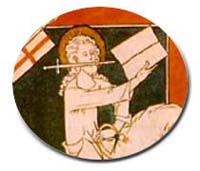 |
Forgotten Truths
St. Augustine and St. Thomas
In Favor of the Death Penalty
Most of the American secular media, as well as many progressivist religious authorities and left-wing movements, are trying to strike down the legislation of the States that carry the death penalty as punishment for certain crimes.
Catholic doctrine as it was taught until Vatican II does not support this liberal position. On the contrary, it clearly states that the death penalty is legitimate. As a contribution to support the correct position, today we bring to the attention of our Readers one excerpt from St. Augustine and two others from St. Thomas defending capital punishment.
St. Augustine
The same divine authority that forbids the killing of a human being establishes certain exceptions, as when God authorizes killing by a general law or when He gives an explicit commission to an individual for a limited time.
The agent who executes the killing does not commit homicide; he is an instrument as is the sword with which he cuts. Therefore, it is in no way contrary to the commandment, 'Thou shalt not kill' to wage war at God's bidding, or for the representatives of public authority to put criminals to death, according to the law, that is, the will of the most just reason.
(The City of God, Book 1, chapter 21)
St. Thomas Aquinas
It is written: "Wizards thou shalt not suffer to live" (Ex. 22:18); and: "In the morning I put to death all the wicked of the land" (Ps. 100:8). …
Every part is directed to the whole, as imperfect to perfect, wherefore every part exists naturally for the sake of the whole. For this reason we see that if the health of the whole human body demands the excision of a member, because it became putrid or infectious to the other members, it would be both praiseworthy and healthful to have it cut away. Now every individual person is related to the entire society as a part to the whole. Therefore if a man be dangerous and infectious to the community, on account of some sin, it is praiseworthy and healthful that he be killed in order to safeguard the common good, since "a little leaven corrupteth the whole lump” (1 Cor. 5:6).
(Summa Theologiae, II, II, q. 64, art. 2)
The fact that the evil ones, as long as they live, can be corrected from their errors does not prohibit that they may be justly executed, for the danger which threatens from their way of life is greater and more certain than the good which may be expected from their improvement.
They also have at that critical point of death the opportunity to be converted to God through repentance. And if they are so obstinate that even at the point of death their heart does not draw back from malice, it is possible to make a quite probable judgment that they would never come away from evil.”
(Summa contra gentiles, Book III, chapter 146)

Posted October 2, 2006


Related Topics of Interest
 The Common Good and the Criminal The Common Good and the Criminal
 Homosexual Priests Must Be Put to Death Homosexual Priests Must Be Put to Death
 The Popes Must Be Militant Guardians of the Flock The Popes Must Be Militant Guardians of the Flock
 Rewriting History to Serve the Gay Agenda Rewriting History to Serve the Gay Agenda
 One Sins by Not Becoming Duly Irate One Sins by Not Becoming Duly Irate
 The Immaculate Conception and True Combativeness The Immaculate Conception and True Combativeness
 Liberals, Modernists and Progressivists Liberals, Modernists and Progressivists

|
Forgotten Truths | Religious | Home | Books | CDs | Search | Contact Us | Donate

© 2002-
Tradition in Action, Inc. All Rights Reserved
|
 |
|